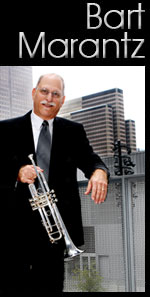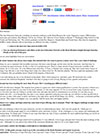 Home B.M.P. BTWHSPVA Articles Interviews Reviews Books Biography Videos Photos Calendar Music Links Contact Sara Marantz Matt Marantz Luke Marantz
Bart Marantz NPR/KERA Jazz Education Interview    Click below to listen to the interview  Click below to read the article 
|
Reviews "Solitude" Words and music by Duke Ellington, Eddie De Lange and Irving Mills Instrumentation: Big Band Arranged by John Berry Publisher: Hal Leonard Cooperation Grade: 1 1/2 Ballad/Swing Tempo = 92 $35.00 What better way to teach jazz than by way of a jazz standard by the master, Duke Ellington. This wonderful ballad remains close to its original style at quarter note equals 92. This is fine, but the director may want to do what Jamey Abersold does on his "Duke" album (volume #12) and try this same chart as a Bossa Nova with straight eighth notes, teaching both Latin and Ballad styles to the beginning jazz student. This arrangement `is from the “Discovery!” series and has lots of help along the way for the very young jazz student. It is suggested by the arranger to play a recording of this wonderful tune for the students. If you own volume #12 of the Jamey Aebersold series you should also play that rhythm section’s interpretation giving your students another aspect of what can be done with a single piece of jazz music. Try to impress on your young players the concept of the swing eighth note. This is perhaps one of the most difficult challenges we face in our quest to "teach" jazz to our students and listening to this style is essential to its understanding. There is a good deal of unison in this chart and it helps to support the entire ensemble in the process of learning the concept of swing. Tell your wind players to play with a legato style throughout the piece. Mark your breaths so that the ensemble is breathing together as this will tighten the sound of the ensemble. The rhythm section should play a “2” beat both at the beginning and again at the end of the piece. The bridge begins at measure 21, where the rhythm section will move the band into a new texture as they kick into a full swing feel. Be patient with your students on this one. Ballad and swing are perhaps some of the most sophisticated concepts that face our students and it will take this arrangement, along with many more like it, to lock in this style with your students. “Solitude” is a great way to begin the process of learning to swing. Top note for trumpet D in the staff. Bart Marantz |


